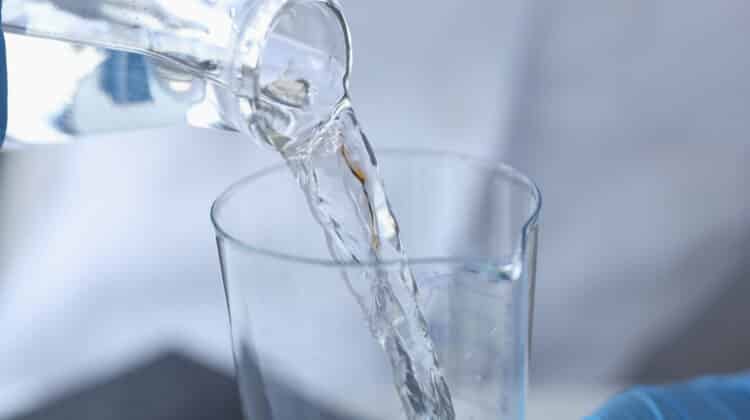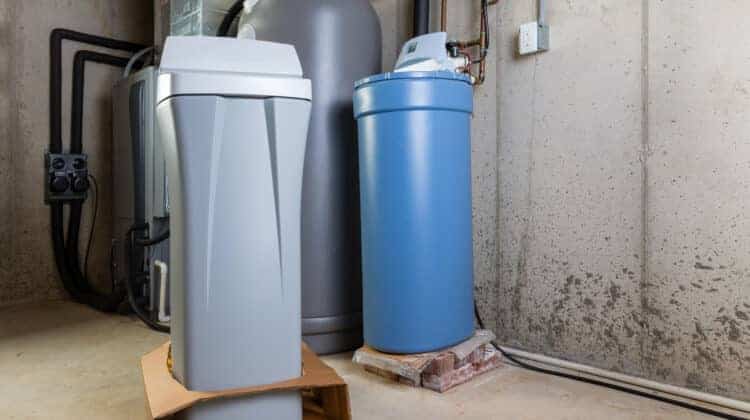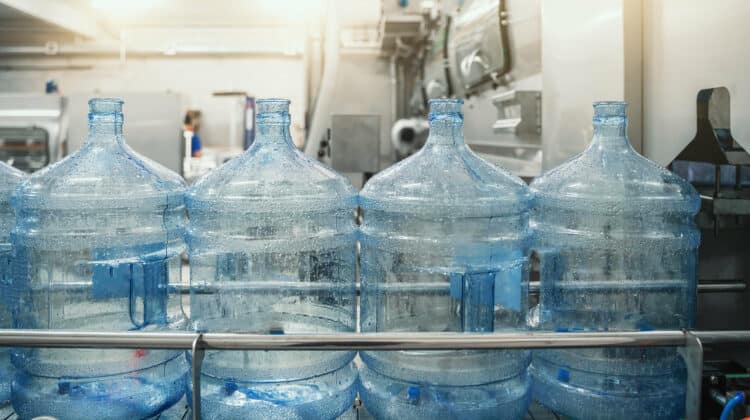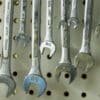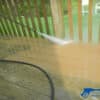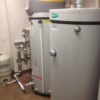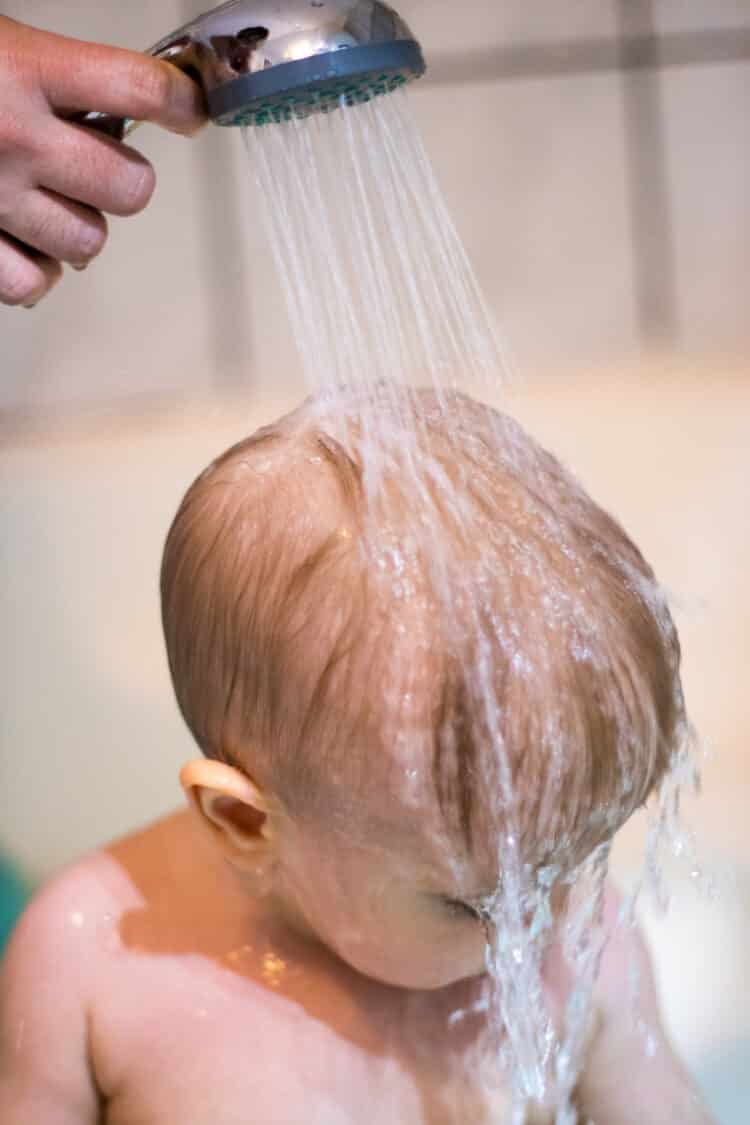
So you thought you’d left your Math nightmares behind? Think again.
Turns out, your teachers were right to drill you with exercises because you’re going to need some basic skills to get the most efficient water softening system for you.
A water softener has a grain capacity that varies between models and differs from household to household.
The most common is a water softening unit that has a capacity of 32,000 grains, but this is usually for families of 4 or less. Larger families will require a unit that can handle more grains.
You may be asking, “how many grains in my water softener will I need?” But it’s actually the other way around: You need to figure out how many grains your household goes through before you get that water softener.
We understand there may be some confusion swirling around as we start talking about grains, water hardness, and cubic feet of resin.
Don’t worry, we’ll try to lay the facts out in the least confusing way possible. Buckle up your Math skills because you are gong to find out how much grain capacity you are going to need for your water softener.
Table of Contents
What is a grain?
When talking about grains in terms of water softeners, it refers to 1/7000th of a pound of dissolved hard minerals such as calcium and magnesium.
Grains Per Gallon (or GPG) is the number of grains found in one gallon of water. The lesser the number, the softer the water.
You can find out your water’s GPG levels with a testing kit or by checking out your local water department’s annual water quality reports.
What is water hardness?
Water hardness refers to the number of hard minerals found in your water. These minerals are usually a combination of calcium and magnesium.
It affects how your household appliances function, the effectiveness of soap, and can leave behind hard scale lime deposits around your pipes, sinks, and faucets.
How is water hardness measured?
One of the ways to measure it is through the amount of grains per gallon (or GPG) found in your water.
A testing kit can do this work for you. Below is a table that shows the classification of a water’s hardness according to GPG:
Grains per Gallon (GPG) mg/L or Parts Per Million (PPM) Classification
Less than 1 Less than 17.1 Soft
1 – 3 17.1 – 51.3 Slightly hard
3.1 – 7 51.4 – 119.7 Moderately hard
7.1 – 10.5 119.8 – 179.55 Hard
10.6 – 15 179.56 – 256.5 Very hard
More than 15 More than 256.5 Extremely hard
Don’t be daunted by the mg/L or Parts Per Million (PPM) column. If you don’t have the GPG, but you do have the PPM or mg/L, then simply divide the mg/L or PPM by 17.1
A GPG that falls between 0 and 3 is considered normal, and you shouldn’t be getting a water softener. If it rises to be between 3 and 7, then you might find dry skin and stain spots to be more common in your household.
Faucets start to become more crusty as a GPG rises through 7 to 11. Lime scale buildups become more frequent in pipes and around showers, faucets, and sinks.
Anything higher than that leads to more problems that affect quality of life.
What is the meaning of a water softener’s grain capacity?
It means the amount of grains (or water hardness) a water softener can clean before it has to “regenerate.”
What does regeneration mean?
Before we go into the meaning of regeneration, you need to understand the basics involved in an ion exchange water softening system.
The basics
Most water softeners come with a resin bed. This resin bead contains little beads called resin beads that play a large part in the ion exchange.
The resin beads contain salt and/or potassium ions.
The ion exchange happens when the hard minerals (calcium and magnesium) found in water become absorbed by the beads.
The beads in turn replace the hard minerals with the salt and/or potassium ions it was holding.
Regeneration
When these beads have done a lot of exchanging, they can get “filled” with so much hard minerals that they won’t be able to absorb any more.
This means they can no longer switch out hard minerals for salt and potassium ions.
To continue giving you quality water, a water softener undergoes a process called regeneration.
Once a water softening unit has run through its grain capacity, it will automatically begin regeneration.
Regeneration “refreshes” or “revives” the resin beads so that they can reabsorb hard minerals again and repeat the entire water softening process.
It involves using large amounts of salted water (from the brine tank) to completely flush out the hard minerals trapped in the resin beads.
It repeats this a few times to make sure the beads are back to working order.
Can’t I just get a large water softener and skip the calculations?
You could, but this leads to problems involving the resin bed. If it’s not used often enough to its full capacity, it could get damaged.
It wouldn’t be used to its full potential, and it’s going to cost you even more salt in the long run.
Similar to using a water softener that’s larger than you need, the same logic applies to having one that is too small.
This leads to more frequent regenerations that could impact the life of your water softening unit.
What is the Salt-Efficiency of a unit?
Although some units boast a 32,000 grains capacity, the amount of softener resin inside them may not correspond to that.
Below is a table that shows a more factual calculation of how many grains a water softening unit can really hold:
Cubic Ft. of Resin Beads Grains Capacity
0.75 15,000
1.0 20,000
1.5 30,000
2.0 40,000
3.0 60,000
4.0 80,000
What does the cubic feet stand for?
Cubic feet stands for the amount of softener resin found in a water softening unit’s resin tank.
How do I calculate water softener grain capacity?
All right so you have all the information you need. Let’s get to calculating!
The formula
# of people in the household multiplied by 75 gallons = Gallons Per Day
Gallons Per Day multiplied by Grains Per Gallon (GPG) = Grains Per Day
Grains Per Day multiplies by 7 = Average Water Softener Grain Capacity
Additional factors
If your water test used the measurements of mg/L or Parts Per Million (PPM), simply divide this number by 17.1 to convert it to Grains Per Gallon (GPG).
If there is iron in your water, every PPM (or mg/L; they’re the same) means you add 5 GPG to your total GPG number.
The explanation
The average person uses about 75 gallons of water per day taking into account the water used in showering, flushing the toilet, washing hands, laundry, etc.
Multiplying this to the number of people in the household gives you the average household water consumption per day.
Once you have that number (Gallons Per Day), simply multiply it to your GPG to get how many Grains Per Day your household goes through.
On average, a water softener has to regenerate at least once a week, so multiply the Grains Per Day by 7 to determine which water softener is best for your household.
Example #1
# of People in the Household: 3
Grains Per Gallon (GPG): 3
Calculations for Example #1
3 people X 75 gallons = 225 Gallons Per Day
225 Gallons Per Day X 3 GPG = 675 Grains Per Day
Salt-Efficiency Calculations
0.75 cubic ft. @ 15,000 grains divided by 675 = Regenerates every 22.2 days
This means that the ideal water softener for this type of household is one that has a capacity of less than 15,000 grains.
The goal is to have a water softener that regenerates once a week, and 22.2 days is too far from 7 days.
In this case, water softening may not even be necessary give the water softness classification.
Example #2
# of People in the Household: 5
Grains Per Gallon (GPG): 6
Iron: 2 PPM
Calculations for Example #2
Since there is iron, we have to multiply it by 5 to convert it to GPG then add it to our current GPG number.
2 PPM of iron X 5 = 10 GPG + 6 GPG = 16 GPG
Now, we have a new GPG which is 16 GPG. On to the rest of the calculations:
5 people X 75 gallons = 375 Gallons Per Day
375 Gallons Per Day X 16 GPG = 6,000 Grains Per Day
Salt-Efficiency Calculations
0.75 cubic ft. @ 15,000 grains divided by 6,000 = Regenerates every 2.5 days
1.0 cubic ft. @ 20,000 grains divided by 6,000 = Regenerates every 3.3 days
1.5 cubic ft. @ 30,000 grains divided by 6,000 = Regenerates every 5 days
2.0 cubic ft. @ 40,000 grains divided by 6,000 = Regenerates every 6.6 days
3.0 cubic ft. @ 60,000 grains divided by 6,000 = Regenerates every 10 days
This means that the ideal water softener for this type of household is one that has a capacity of 40,000 grains because it is the closest to the 7, the number of days in a week.
The goal is to have a water softener that regenerates once a week, and 6.6 days is the closest.
Conclusion
It may seem daunting when you’re faced with the Math of determining the best water softener for your household.
This guide is one of the easiest ways to figure it out, and it contains all the information you need.
Everything is already laid out; you just need to use the formula and replace the values so that you can get the best-sized water softener for you.
